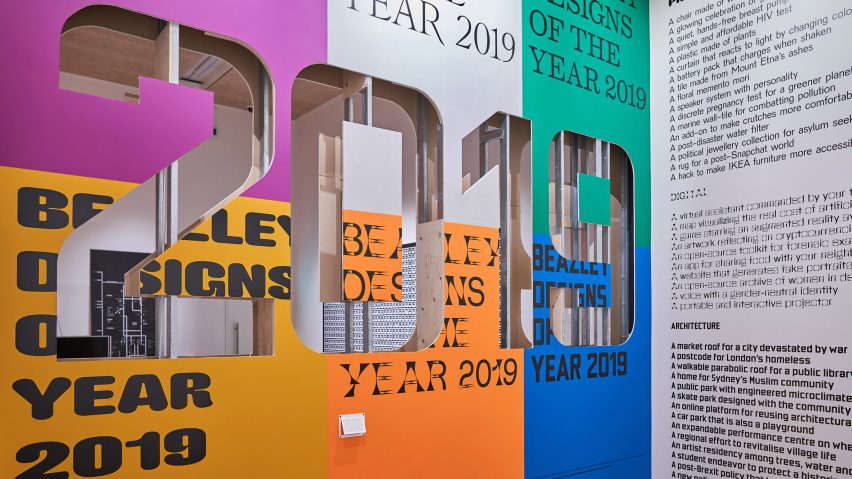Contenders for this year's Beazley Designs of the Year awards include Diller Scofidio + Renfro's The Shed, a pocket-sized home HIV test kit, and the world's first genderless voice.
A total of 76 innovative designs including clothing, buildings, apps, books, homewares and posters that have made a strong global impact are nominated for this year's award, which is given by London's Design Museum.
Projects range from the serious – such as ProxyAddress, a system that provides the homeless with the postcode of an empty address so that they don't lose access to services – to the playful, including a game featuring a tiny AR avocado.
Sustainability was an important factor in many of the designs such as the Lia flushable pregnancy test, an online directory for reusing architectural waste called Opalis and the Olio app that encourages neighbours to share unwanted food.
Nominations were made in six categories – architecture, design, fashion, graphics, product and transport – with a winner in each category and an overall winner, to be announced later this year.
Across the categories, this year's nominations are the most international and gender-balanced list to date, according to the Design Museum.
In the architecture category, high-profile projects such as The Shed in New York designed by Diller Scofidio + Renfro with Rockwell Group and the MK Gallery in Milton Keynes by 6a Architects sit alongside public parks in Taiwan and Greece.
In digital design, Q the genderless voice by creative agency Virtue that provides a gender-neutral alternative to the often female voice assistants, sits alongside projects that illustrate the darker side of technology.
This Person Does Not Exist is a website that generates fake portraits, while Anatomy of an AI System is a map that visualises the human cost of Amazon Echo and other AI-based systems.
The fashion category sees Ji Won Choi's designs for Adidas that are based on Korean clothing and were worn by Beyonce, and the slogan dresses from Viktor and Rolf's Spring Summer 2019 couture collection, pitted against swimwear designed for all body types and a modelling agency for diverse faces.
In graphics, political activism takes centre stage. Direct action anti-Brexit group Led by Donkeys' billboard statements by politicians, UK Student Climate Network placards, a feminist ad campaign and a book celebrating female designers called notamuse are all nominated.
The product design category includes a number of projects designed to make difficult tasks more simple, such as a home HIV test kit by Hans Ramzan, a hands-free breast milk pump created by Elvie, silicone covers to make crutches more comfortable and a clay water filter.
Transport designs focused on cyclists with the Loffi glove with a smile on the palm, a government scheme to protect cyclists from heavy goods vehicles and ride-sharing service Uber's Jump electric bikes.
The CanguRu mobility robot that can carry shopping and transform into a three-wheeled motorcycle was also nominated in the transport category.
The exhibition design by architect Pernilla Ohrstedt uses elements from previous exhibitions in order to reduce waste.
Ohrstedt cut holes through the existing backdrops to allow visitors to look at different categories simultaneously and draw connections. The cutout material has been transformed into plinths on which to display nominated pieces.
The exhibition is guest curated by design writer and curator Beatrice Galilee, who resigned as the architecture and design curator at The Met in New York earlier this year.
This year the judging panel is chaired by Paul Thompson, vice-chancellor of London's Royal College of Art and a previous director of the Design Museum.
Other judges include editor of Wallpaper magazine, Sarah Douglas, designer Yinka Ilori who created this year's Dulwich Pavilion, Melissa Hajj who directs product design at Facebook and designer Martino Gamper. For the first time, the designs will also be placed to a public vote.
The winner of each category and an overall winner that will be named Design of the Year will be announced on 21 November at London's Design Museum.
The Beazley Designs of the Year exhibition will be on display from 11 September 2019 until 9 February 2020. The full list of shortlisted projects is available on the Design Museum's website.
Last year a exhibition by Counter Investigations by Forensic Architecture was named Design of the Year, while in 2017 David Adjaye's African American history museum won the prize. Also in 2017 Design Museum director Deyan Sudjic revealed that he thought it was a "howling error" that the iPhone wasn't named Design of the Year when it was nominated in 2008.

